The Intel Core i9 14900K vs AMD Ryzen 9 7950X3D gaming shootout
We compare the two companies' flagship CPUs in a series of head-to-head matchups.
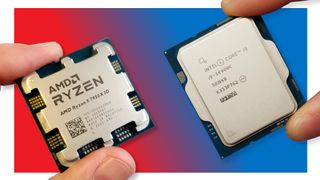
If you're building the ultimate gaming rig, you'll want to know the answer to this question: What is the best gaming processor you can buy? Is it the AMD Ryzen 9 7950X3D or the Intel Core i7 14900K? We're here to answer that question.
When it comes to the question of Core i7 14900K vs Ryzen 9 7950X3D, both processors have their strengths and weaknesses, and both go about things in different ways. The 14900K goes for the brute force approach, offering clock speeds as high as 6.0GHz. Other things being equal, a higher clock speed means higher performance. Its problem is it runs hot and requires a lot of power when presented with a full load.
AMD's flagship incorporates stacked V-Cache, offering 128MB of on-chip level 3 cache compared to the 14900K's mere 32MB. That means more data can be stored 'close to the metal'. In games that benefit from low latency and fewer relatively slow memory accesses, this approach is a good one. However, the 7950X3D only includes V-cache on one of its two dies, and its lower clock speeds in comparison with the standard 7950X can hamper performance under non-gaming workloads.
These chips don't exist in a vacuum. While both AMD and Intel promote their top chips as the ultimate gaming CPUs, there are other options that are nearly as good, if not basically identical under graphically limited workloads. The excellent Ryzen 7 7800X3D and Core i5 14600K are both more than capable gaming chips in their own right, though they don't offer the kind of all round single and multi-threaded performance on offer from the top chips. However, for use with anything less than a high-end graphics card, they are both fine chips.
If you want the full low-down on each of the chips we're talking about here individually, it's well worth reading our reviews of both the Core i9 14900K and Ryzen 9 7950X3D. There you'll find all the details regarding their architectures, features and characteristics. Then come right back here!
So, to boil it down, it's all about clocks or cache. Which is better? I've run both chips through their paces looking at gaming with both high and low details along with a few system benchmarks and some power and temperature comparisons. Straight up, neither chip is a bad choice, but there can only be one winner.
Specifications
The Intel Core i9 14900K is essentially a Core i9 13900K with higher clock speeds. It's a 24-core/32-thread processor, made up of eight Performance-cores (P-cores) and 16 Efficient-cores (E-cores). It includes a total of 32MB of L2 cache. Each of the eight P-cores has 2MB each, with the four E-core clusters having access to a shared 4MB.
The biggest gaming news, reviews and hardware deals
Keep up to date with the most important stories and the best deals, as picked by the PC Gamer team.
The 36MB of shared L3 cache is accessed via an internal ring bus which now runs at 5.0GHz. The 14900K's official memory support has increased to DDR5-5600, but as you'll probably know, the 14900K unofficially supports speeds much higher than this. The latest Z790 refresh motherboards are capable of speeds of over 8000MHz. The 14900K does continue to support DDR4 memory but this will be the last generation to do so.
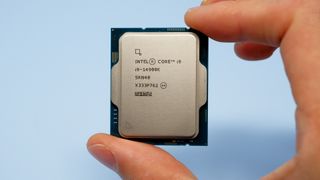
In order to promote the 14900K as its fastest CPU, Intel has had to push the limits of the Intel 7 production process. It's capable of boosting its P-cores as high as 6.0GHz when power and thermal conditions allow, while the E-cores can reach up to 4.4GHz. Essentially it's a slightly overclocked i9 13900KS.
Like all overclocked processors, chucking more power at a chip delivers diminishing returns. To reach its high frequencies, the 14900K can consume over 300W with its limits removed. That applies to pretty much every enthusiast tier motherboard! 300W+ means there's a lot of waste heat. Even a 360mm AIO liquid cooler is barely able to tame a 14900K when it's fully loaded.
| Header Cell - Column 0 | Intel Core i9 14900K | AMD Ryzen 9 7950X3D |
|---|---|---|
| Cores (P+E) | 8 + 16 | 16 |
| Threads | 32 | 32 |
| L3 Cache | 36MB | 128MB |
| L2 Cache | 32MB | 16MB |
| Multiplier Unlocked | Yes | Yes |
| Max PCIe Lanes | 20 | 24 |
| Graphics | UHD 770 | Radeon RDNA 2 |
| Official Memory Support (up to) | 5600 MT/s | 5200 MT/s |
| Base Power (W) | 125 | 120 |
| Turbo Power (W) | 253 | 162 |
| Launch price | $589 | $699 |
On the red side, the AMD Ryzen 9 7950X3D is fundamentally the same as the Ryzen 9 7950X with the addition of 64MB of V-Cache and some power and clock speed adjustments. It's a Zen 4 chiplet based design, with dual 8-core Core Complex Dies (CCDs) and a shared I/O die. It includes a dual compute unit RDNA 2 based integrated GPU and support for DDR5-5200. DDR5-6000 or a little above remains the performance sweet spot for Zen 4 chips. Though 600-series motherboards with the newer BIOS are able to support much higher speeds, running a very fast kit requires dropping the memory controller clock to a lower speed, which costs a lot of performance.
Whereas the 7950X includes 32MB per CCD for a total of 64MB, the 7950X3D comes with an extra 64MB for a total of 128MB. If one includes the L2 cache (1MB per core) the total is 144MB. However, only one CCD comes with stacked cache. AMD says this is for cost and diminishing return reasons. This leaves one CCD free to clock to higher levels and the other with the gaming friendly V-cache. This approach requires software awareness to benefit fully. If you do buy this chip, keep an eye on AMD's chipset driver changelogs to check for performance updates.
The 7950X3D would surely benefit from some sort of hardware level thread scheduling, much like Intel's Thread Director.
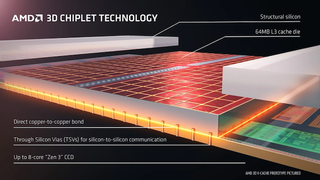
The 7950X3D is downclocked compared to the 7950X, but not by all that much. Its base clock is 4.2GHz, lower than the 4.5GHz of the 7950X, yet the boost clock remains the same at 5.7GHz. That leaves the 7950X3D in a kind of neither here nor there situation. Its gaming performance is hardly better than the 7800X3D, while the lower clock speeds compared to the 7950X can lead to lower productivity performance under fully loaded conditions.
There is an upside. Lowered all core clocks mean AMD was able to drop the TDP of the 7950X3D to just 120W vs the 170W of the 7950X. This means the 7950X3D is stunningly power efficient and much easier to cool than its Intel competitor. That counts for a lot.
1440p Low Detail Benchmarks
Before getting to the benchmarks, a few notes on testing methodology. It's well known that lower resolutions tend to be more CPU limited. However, I decided to adopt a more real world testing approach. These are generally not CPUs you'd use for gaming on a 1080p screen. There are exceptions though, such as if you're looking to push hundreds of FPS in competitive shooters, but in most cases, a card like the RTX 4090 that I'm using here is overkill for 1080p. If you're using anything less than a high end graphics card, there is less of a need for a high-end CPU.
2560 x 1440 is my starting resolution. As high refresh rate 1440p monitors become more prevalent, there is a need for a fast CPU to keep average frame rates in the 100 FPS+ range and raise 1% lows. So, with that in mind, I have run a series of benchmarks at 1440p with both high and low graphics settings. At high settings, you get a real world set of results, while the low detail benchmarks provide a better contrast between both CPUs.
I've thrown in a set of high detail results at 4K too. That's where a card like the RTX 4090 is at home. If you're fortunate to be gaming with an RTX 4090, it's likely you own a high refresh rate 1440p or 4K gaming monitor and play games with eye candy and ray tracing effects turned on. I can't imagine too many users will choose to game at 4K with low details over 1440p at high details, so I did not run 4K benchmarks at low graphics settings.








Depending on how a particular game is coded, these results really show up the different strengths of the CPUs. We get a good look at how some games respond well to AMD's 3D V-cache. F1 21 is a case in point. Metro Exodus is another one that surprisingly favors the 7950X3D. Others prefer the high frequencies of the 14900K. Far Cry 6 and particularly Ghost Recon Breakpoint are ones that run better on the Intel chip.
Even at low settings, some demanding games like Cyberpunk 2077 still ask a lot of the RTX 4090, in which case the CPU is less relevant.
These results really show up the different strengths of the CPUs depending on how the game is coded.
Some games like Tiny Tina's Wonderlands, or games running into the hundreds of frames per second, have smaller percentage differences. It's tough to call a winner here. We can't go and test 100 games, but based on this set of results I'd give the win to the 7950X3D, if only because of its power efficiency and lower cooling requirements. Either chip will give you excellent gaming performance.
Result: Ryzen 9 7950X3D wins!
1440p High Detail Benchmarks








At higher detail settings, the results close up as the load shifts back to the graphics card. F1 21 still favors the 7950X3D, while Ghost Recon Breakpoint favors the 14900K. The others are mostly within a margin of error.
Other than these two outliers, these results show that the GPU is far more important when it comes to gaming performance when the graphical options are turned up. Let's call this one a tie.
Result: It's a tie
4K High Detail Benchmarks








At 4K with high graphical settings, the 7950X3D and 14900K close up even more. F1 21 and Ghost Recon Breakpoint still perform better on the 7950X3D and 14900K respectively, but the other results are basically tied.
Once again, neither chip is a slouch when it comes to high detail gaming, but given the power advantage of the 7950X3D, it'd give this one to AMD by a hair.
Gaming isn't the only use for a high end CPU though…
Result: Ryzen 9 7950X3D wins!
System and Synthetic Benchmarks






Although the aim of this article is to show off both chips' gaming prowess, they are used for other things too, obviously.
Beginning with 3DMark, the Time Spy Extreme physics test favors the 14900K, which in turn gives it a higher overall score. The graphics tests, and indeed the Port Royal test show the RTX 4090 is the ultimate arbiter of performance in these tests, with both sets of results falling within a margin of error.
The high frequencies and consistently high performance of the 14900K leave it superior to the 7950X3D in productivity applications
The high frequencies and consistently high performance of the 14900K leave it superior to the 7950X3D in productivity applications. Though not included here, encoding tests tend to favor the 14900K too. Intel wins this round.
Result: Core i9 14900K wins!
Power and Temperatures




Finally we come to a look at power and temperature results. There's a lot of noise around the 14900K and its high power consumption and the resulting need for a high end cooler to keep it from throttling. When you load it up fully, that is definitely the case, but under gaming loads, the 14900K is a lot more power efficient than all those peak power consumption tests you'll come across would suggest.
Still, the 7950X3D is by far the more power efficient of the two chips. It's particularly helped by its lower peak power numbers. The 14900K's spikes are much higher, though still below the all core loads you'd see when running heavy loads.
under gaming loads, the 14900K is a lot more power efficient than all those peak power consumption tests you'll come across would suggest.
You'd expect the temperature results to heavily favor AMD, but they really don't. AMD's Zen 4 chips can get hot, and although AMD says this behaviour is expected, you can't ignore the need for a capable cooler.
So, even though the 14900K is far less of a nuclear reactor under gaming conditions, the 7950X3D is still more power efficient. A win to AMD here.
Result: Ryzen 9 7950X3D wins!
Analysis and Conclusion
In summary, both chips are capable gamers. I would very narrowly award the win to the AMD chip in terms of pure gaming but only by account of its superior power efficiency. I'll take lower power consumption over a few extra frames. Your thinking might be different. No one will argue with you if you choose the Intel option.
But there's more to a CPU than just gaming. The Intel chip is superior in productivity tests, and its idle and light load power consumption is much better than its stratospheric peak load numbers would suggest. Power consumption aside, the 14900K is the better all round CPU. It's also more affordable.
As I mentioned in the introduction, the problem for these chips is that games generally don't require a flagship CPU. On Intel's side of things, chips like the i5 14600K or i7 14700K are very nearly as good under gaming loads, while running cooler, using less power, and being more affordable.
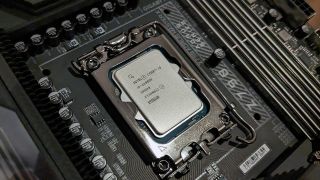
The 7950X3D—Despite AMD suggesting it is the ultimate gaming CPU—is not AMD's best gaming chip, all considered. That honor goes to the Ryzen 7 7800X3D. Its single 8-core CCD includes the extra 64MB of V-cache, but it's much cheaper than the 7950X3D and it isn't, shall I say burdened by the extra cores of the 7950X3D. 32-thread CPUs are not needed for gaming in most cases, not while there are millions of quad core gaming machines out there for developers to cater for.
The other problem for the 7950X3D is AMD's own 7950X. Despite its extra cache, the lower all core frequencies of the X3D chip means it's slower than the non-X3D in many cases. The 7950X3D, in trying to be a one-for-all wonder CPU, doesn't do enough to excel in all areas, even though it comes close.
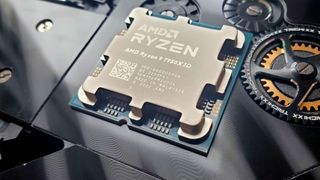
the 14900K is an excellent all round performer, but at the cost of power efficiency. The 7950X3D is a capable and efficient gaming chip, but isn't the all round wonder chip we'd like it to be.
If you need multi-threaded performance, the 7950X is the better of the two, while being fractionally cheaper and losing relatively little in gaming performance. If you're a gamer first and foremost, the 7800X3D is cheaper, delivering very good performance while allowing you to divert a couple of hundred dollars towards a GPU that will deliver a more tangible gaming performance boost.
In conclusion, the 14900K is an excellent all round performer, but at the cost of power efficiency. The 7950X3D is a capable and efficient gaming chip, but isn't the all round wonder chip we'd like it to be. Your own needs, wants and use cases will determine which one is more suitable for your build.

Chris' gaming experiences go back to the mid-nineties when he conned his parents into buying an 'educational PC' that was conveniently overpowered to play Doom and Tie Fighter. He developed a love of extreme overclocking that destroyed his savings despite the cheaper hardware on offer via his job at a PC store. To afford more LN2 he began moonlighting as a reviewer for VR-Zone before jumping the fence to work for MSI Australia. Since then, he's gone back to journalism, enthusiastically reviewing the latest and greatest components for PC & Tech Authority, PC Powerplay and currently Australian Personal Computer magazine and PC Gamer. Chris still puts far too many hours into Borderlands 3, always striving to become a more efficient killer.
Most Popular


